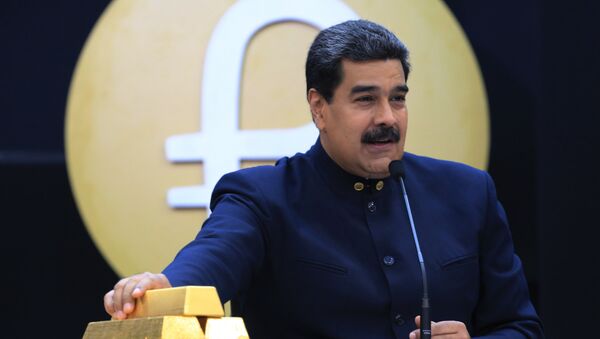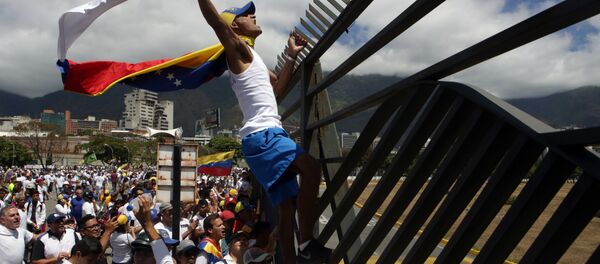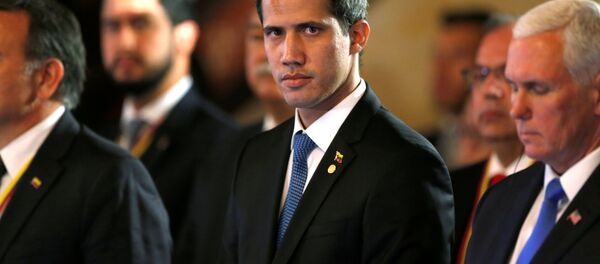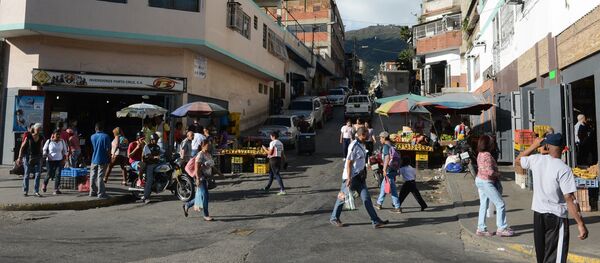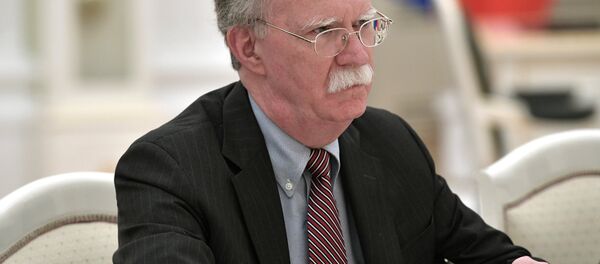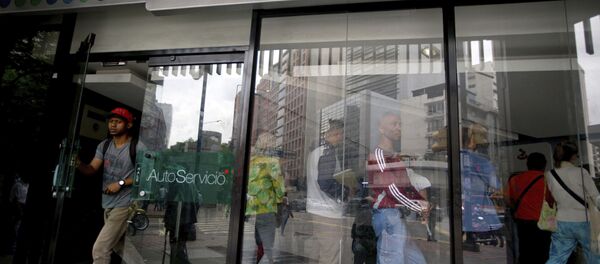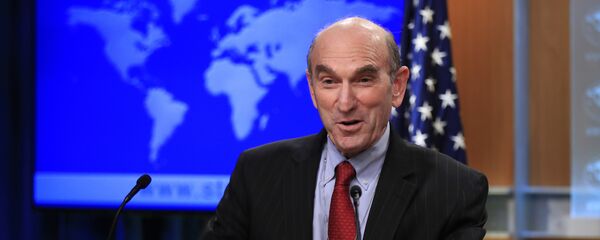After his arrival, Guaido greeted crowds at an opposition rally and called on his supporters to take to the streets for more protests on Saturday.
Sputnik has discussed the situation in Venezuela with Professor Heinz Dieterich, an adviser to the late Venezuelan president Hugo Chavez, who now manages a research centre at the Universidad Autonoma Metropolitana in Mexico City.
Sputnik: The economic crisis that's continuing in Venezuela started in the last century under the former leader Hugo Chavez. In your view has the situation spiralled now even more so under President Maduro?
Heinz Dieterich: Maduro inherited an economic and political model that was already in crisis in the last years of President Chavez's government and that was due to the 2008 world financial economic capitalist crisis which brought down the oil price and the whole model of Hugo Chavez had been based on the foreign income of the high oil price plateau, and that was enough to satisfy the Venezuelan bourgeoisie and the masses and also the US transnational corporations who were omitted from in the oil exploitation.
READ MORE: Fewer and Fewer States Support US Venezuela Strategy — Ex Ecuadorean FM
When the people rebelled then he became more repressive and in the end it became a normal bourgeois dictatorship with a democratic facade, nothing more. So he is a usurper of a historical project which was democratic and progressive and he really underdeveloped it to the point where now there is no way to save him. And the people who try to maintain him in power really are trying to move a dead horse. There's no way to save him.
Sputnik: It's very interesting what you're saying in terms of this extreme loyalty that his lieutenants are showing him. Just referring back to Hugo Chavez he himself was a very popular leader and he enjoyed somewhat massive support from the military. What can be said about the army's support for Maduro? I've just eluded to it and you have as well, it's absolutely essential for his continuance, how long is it going to remain, how crucial is the army's support in this situation?
In part that was due to advanced Russian military technology like the Sukhoi Su-30 fighter planes, Kalashnikovs and anti-aircraft missiles and so on. So again, Maduro inherited a very capable, a very powerful in the hardware and the software camp, powerful army. Now he really destroyed it, the same way he destroyed the economy and that's very easy to see.
He had, for example, about 1,500 generals in the army which was 4 to 5 times more than the functional need you have for generals, and the army has a very low plateau now of troops, it maybe less than 80,000, and combat morale is low because when they were with Chavez they had a mission and they were willing to die for Chavez and fight for the country, but how are they going to die for Maduro? That will not work.
READ MORE: Moscow Monitoring Talks of US Military Intervention in Venezuela — Russian PM
Sputnik: You've said that the opposition leader Mr Guaido was an employee of the empire, how likely is it that Venezuela's military will allow him to call the shots? From what you've said in your last answer it's only a matter of time then?
So there is now only one option for Guaido, everybody knows that he is what the Romans called proconsuls or what we call neocolonial administrators of imperialist backyards, and he lost the battle of February 23 this year when he said he would open the border by force for US aid which was a plan by the USA, of course, because it was a repetition of what they did with the Berlin wall in Germany. So the plan by Guaido was to open the borders by force and that would be the end of Maduro and he was defeated, it didn't work.
READ MORE: Guaido Vows to Return to Venezuela After Ecuador Visit — Reports
So at the end, if Guaido does not become a martyr in the process, he will be the next president, unless, and this is important for Russian and Chinese diplomacy, unless they form a third force; because it cannot be Guaido as the president, it cannot be Maduro as the president. There must be a third force because otherwise it will be a new colony of the United States. So I think that on the world level diplomacy does not understand really what the future options are.
Sputnik: The US has also not ruled out military intervention in the country, what consequences can this move have not only on Venezuela, but on the whole region, is it going to destabilise it, surely?
So a military intervention is possible but it will not be necessary, what they will do is they will repeat the criminal action by Ronald Reagan against the Sandinista revolutionary government when he armed 20,000 mercenaries in Honduras to destroy the Nicaraguan economy, they never had a decisive military victory, they were already defeated by the weakened economy. At the end 85% of the Nicaraguan budget was for defence and so you cannot have a civilian government that survives that. So at the end the Sandinistas were put out of government by a right-wing government.
And that's the plan here. The role of Honduras as the rearguard for the paramilitaries, of course, is Columbia and to a second degree Brazil. And there's also been information now by Russian sources that the US is already buying weapons in certain Eastern European countries which are being flown to Colombia and Colombia have army bases by the US. Venezuela is, in fact, surrounded by military bases of the US, but a direct intervention would generate a patriotic backlash in Venezuela and the military would fight that and the US understands that.
READ MORE: Negative External Impact on Venezuela Has Nothing to Do With Democracy — Lavrov
So what they will do is what they did in Nicaragua and in Chile against Allende. They will destroy the economy with paramilitary forces until a right-wing configuration of power can become officially the new government. But direct open intervention will not be necessary, and they will not risk people coming back in plastic bags, because now they're already in an electoral situation and Venezuela is one of the main topics of that electoral discussion now.
Sputnik: Professor, you mentioned the support that the countries such as Colombia and Brazil are offering to the opposition leader and allowing the US to use their countries for transit for the humanitarian aid and for military hardware, of course, why are these countries helping the US? What can they gain by siding with Washington in this issue, it's very interesting that the majority of the South American countries are all in support of Guaido and the US, I think there's only Uruguay that's in support of Venezuela, why are countries like Colombia and Brazil such strong support with regard to the US?
They want to be an ally of the US because then they may have some small advantages in the economic field and so on. So you have two strategic choices which you can make in Latin America since Simon Bolivar, since the independence two hundred years ago: either you create a sovereign hemispheric power centre, which is 4-5 big states, confederations as he proposed, or you join the US as the subordinate ally. And these two principles to become a sovereign hemisphere versus the imperial powers of the United States and the Europeans, this tension between hemispheric, nationalistic Latin American future against an imperial-dominated European or US foreign control by the Monroe Doctrine, a neocolonial system that has been decisive.
READ MORE: UNSC Defended International Law by Vetoing US Resolution on Venezuela — Morales
So they have lost against the two major world powers and they try to maintain themselves in a competitive situation by controlling Latin America. Because there you have 650 million citizens more, you have direct access to the Antarctic, which is fundamental, and you have immense natural resources. So they need to ferociously control Latin America because they have lost, for now, the competition for world governance against China and against Russia. That is the basic reason behind all of this.
The views expressed in this article are solely those of Heinz Dieterich and do not necessarily reflect the official position of Sputnik.
